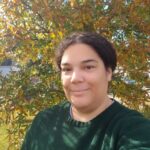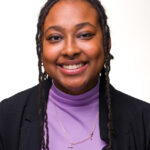
Name: Ajan Coleman
Major: Computer Science
Research Title/Project: “Plant Hyperspectral Spectroscopy Data Research” – My project involves the analysis of collected and legacy hyperspectral data. My primary goal is to extract crucial plant characteristics like leaf chlorophyll content, leaf mass per area, flower pigment, and more, using a blend of physical and statistical algorithms. I will be working with different aspects of data analysis, including working with .csv files to get necessary information. I also will have the opportunity to use programming languages like R and Python.
Research Mentor: Dhruva Kathuria (618/MSU)
What attracted you to this fellowship opportunity?
As a computer science major, this opportunity presents a platform for shaping my future career path. Having engaged in research during the past summer, I found that I enjoyed the process, thus driving my desire to explore and validate my passion in this field. Furthermore, this experience offers me an opportunity to expand my knowledge in an unexplored domain and will help me to build a professional network.
Update: Ajan will graduate from Morgan in May 2025.

Name: Ashley Curry
Major: Architecture and Environmental Design
Research Title/Project: “Weather Prediction and the Energy Sector” – My focus is on weather forecasting and the energy sector. I will be researching how energy companies in the U.S. can use better weather prediction metrics to lower energy costs for buildings, and also contribute to a more reliable and sustainable grid system.
Research Mentors: Nikki Prive’ and Erica McGrath-Spangler (both 610.1/MSU)
What attracted you to this fellowship opportunity?
This fellowship opportunity provides the unique chance to explore research as an undergraduate student, and to connect forecast improvement metrics to my field of study, environmental design. This is also a great opportunity for me to further develop my research, writing, and communication skills in a more professional setting.

Name: Teqwon Norman (Summer 2024)
Major: Computer Science
Research Title/Project: “Extreme Precipitation Analysis and Monitoring” – Extreme precipitation causes significant socioeconomic impact due to floods, landslides and other rain-triggered natural hazards. Satellite precipitation measurements can help us understand the distribution and characteristics of extreme precipitation. Real-time satellite measurements allow us to monitor the extreme precipitation in real-time globally. This project works on a near-real-time Extreme Precipitation Monitoring System (ExPreS) using the state-of-art Integrated Multi-satellitE Retrievals for GPM (IMERG) data. The ExPreS monitors global extreme precipitation in near-real-time for extreme events with at least more than one Average Recurrence Interval (ARI), i.e., events appear only once every year, or even more rare events, for the purpose of disaster warning. We will be testing extreme precipitation modeling system written in R code and provides maps and validation analysis for selected regions.
Research Mentor: Yaping Zhou (613/UMBC)
What attracted you to this fellowship opportunity?
I was drawn to this fellowship opportunity because it aligns perfectly with my interests and skillset. As someone who truly enjoys Python programming, data structures, and algorithms, the chance to refactor a complex algorithm in into Python is immensely exciting. Translating code across languages allows me to learn new concepts and expand my knowledge, which I find incredibly rewarding. Furthermore, I am thrilled at the prospect of learning how to effectively apply software engineering principles and best practices to scientific computing applications through this fellowship experience.
Update: After his fellowship with GESTAR II and graduating from Morgan, Teqwon went to work for Google as a software engineer.

Name: Olamilekan Sulaiman
Major: Computer Science
Research Title/Project: “Landslide Research” – My Goddard Space Flight Center research project aims to generate a new database of landslides within a specified area of interest by merging well-established NASA statistics on precipitation and terrain. I will process and analyze the data using Python, identifying places with precipitation-triggered landslides and doing an initial scientific assessment to acquire insight into the distribution and factors impacting landslide occurrences. Data processing and integration, geographic analysis, database building, data visualization, statistical analysis, and scientific evaluation are all skills that I am trying to integrate within Python.
Research Mentor: Thomas Stanley (617/UMBC)
What attracted you to this fellowship opportunity?
I was particularly interested in this fellowship as a rising senior studying in computer science for a number of reasons. First and foremost, I’m excited about the chance to collaborate closely with specialists in the field and business people. I am confident that this experience will considerably improve my technical proficiency and increase my knowledge of computer science’s practical applications.
I consider this fellowship to be a wonderful networking opportunity that may lead to promising future employment opportunities. Overall, I think this fellowship is the ideal setting for me to push myself, absorb the best knowledge, and have a beneficial influence on the field of computer science.

Name: Micah Wallace
Major: Computer Science
Research Title/Project: “Can neural networks learn to see airborne dust and sand in thermal satellite imagery?” – With my mentors, I will be analyzing infrared data from the VIIRS satellite instrument to develop a neural network capable of quantifying dust in the atmosphere. After training the neural network on simulated measurements, we aim to have it analyze the amount of dust. The research will be done in Python, using TensorFlow for the machine learning components.
Research Mentors: Ian Carroll and Andy Sayer (both 616/UMBC)
What attracted you to this fellowship opportunity?
The GESTAR II fellowship provides me with a unique opportunity as a computer science student to gain practical work experience, develop a strong professional network, and contribute to the mission of GESTAR II. This fellowship also meant that I would have the opportunity to work at NASA and have access to an incredible wealth of knowledge. It’s NASA! Who wouldn’t jump at the chance to be part of that?
Update: After she completed the fellowship, Micah was part of the Translation AI Center at Iowa State in summer 2024. She will graduate from Morgan in May 2025.